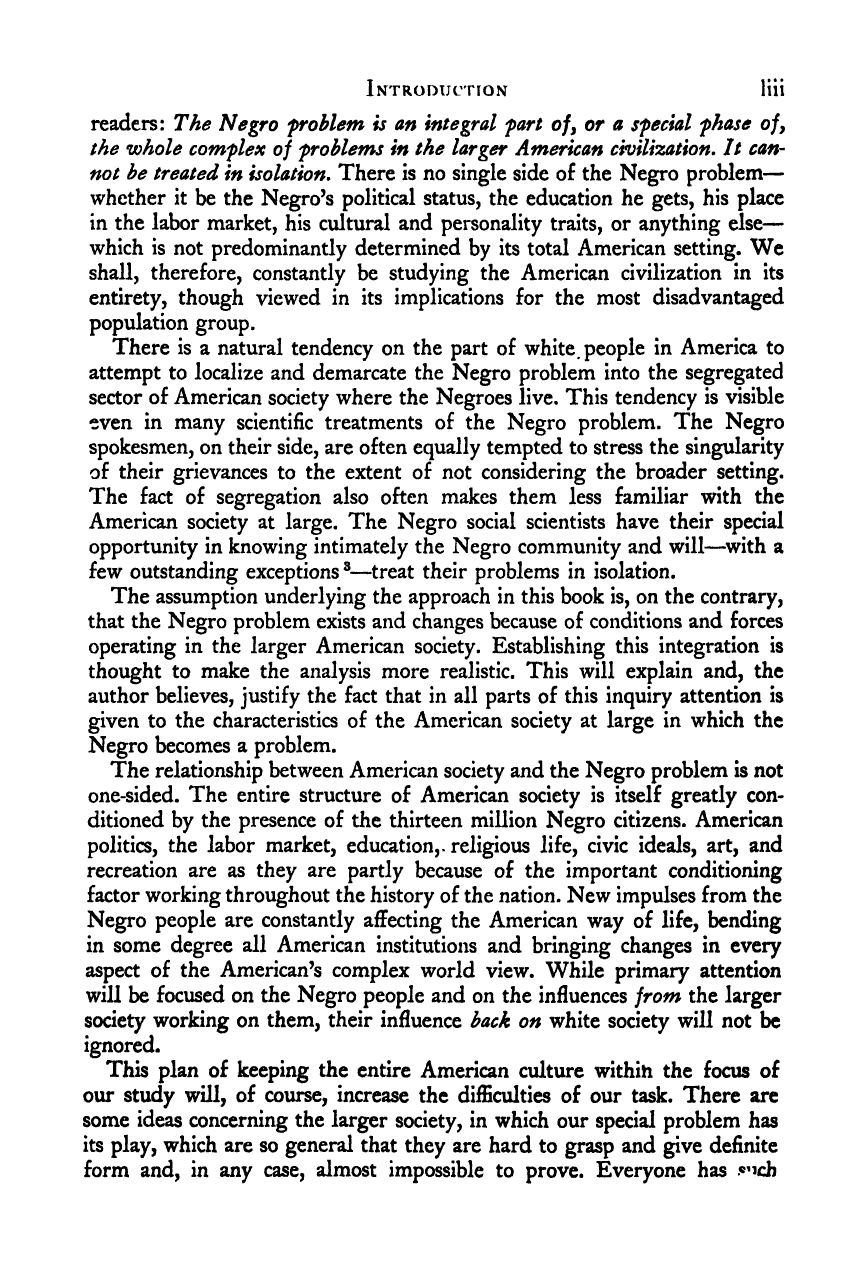Note: Gunnar Myrdal died in 1987, less than 70 years ago. Therefore, this work is protected by copyright, restricting your legal rights to reproduce it. However, you are welcome to view it on screen, as you do now. Read more about copyright.
Full resolution (TIFF) - On this page / på denna sida - Introduction - 4. Not an Isolated Problem

<< prev. page << föreg. sida << >> nästa sida >> next page >>
Below is the raw OCR text
from the above scanned image.
Do you see an error? Proofread the page now!
Här nedan syns maskintolkade texten från faksimilbilden ovan.
Ser du något fel? Korrekturläs sidan nu!
This page has never been proofread. / Denna sida har aldrig korrekturlästs.
Introduction liii
readers: The Negro froblem is an integral fart of, or a sfecial fhase of,
the whole comflex of froblems in the larger American civilization. It can-
not be treated in isolation. There is no single side of the Negro problem
—
whether it be the Negro’s political status, the education he gets, his place
in the labor market, his cultural and personality traits, or anything else
—
which is not predominantly determined by its total American setting. We
shall, therefore, constantly be studying the American civilization in its
entirety, though viewed in its implications for the most disadvantaged
population group.
There is a natural tendency on the part of white, people in America to
attempt to localize and demarcate the Negro problem into the segregated
sector of American society where the Negroes live. This tendency is visible
even in many scientific treatments of the Negro problem. The Negro
spokesmen, on their side, are often equally tempted to stress the singularity
of their grievances to the extent of not considering the broader setting.
The fact of segregation also often makes them less familiar with the
American society at large. The Negro social scientists have their special
opportunity in knowing intimately the Negro community and will—^with a
few outstanding exceptions ^
—treat their problems in isolation.
The assumption underlying the approach in this book is, on the contrary,
that the Negro problem exists and changes because of conditions and forces
operating in the larger American society. Establishing this integration is
thought to make the analysis more realistic. This will explain and, the
author believes, justify the fact that in all parts of this inquiry attention is
given to the characteristics of the American society at large in which the
Negro becomes a problem.
The relationship between American society and the Negro problem is not
one-sided. The entire structure of American society is itself greatly con-
ditioned by the presence of the thirteen million Negro citizens. American
politics, the labor market, education,, religious life, civic ideals, art, and
recreation are as they are partly because of the important conditioning
factor working throughout the history of the nation. New impulses from the
Negro people are constantly affecting the American way of life, bending
in some degree all American institutions and bringing changes in every
aspect of the American’s complex world view. While primary attention
will be focused on the Negro people and on the influences from the larger
society working on them, their influence back on white society will not be
ignored.
This plan of keeping the entire American culture withih the focus of
our study will, of course, increase the difficulties of our task. There are
some ideas concerning the larger society, in which our special problem has
its play, which are so general that they are hard to grasp and give definite
form and, in any case, almost impossible to prove. Everyone has .«’icb
<< prev. page << föreg. sida << >> nästa sida >> next page >>